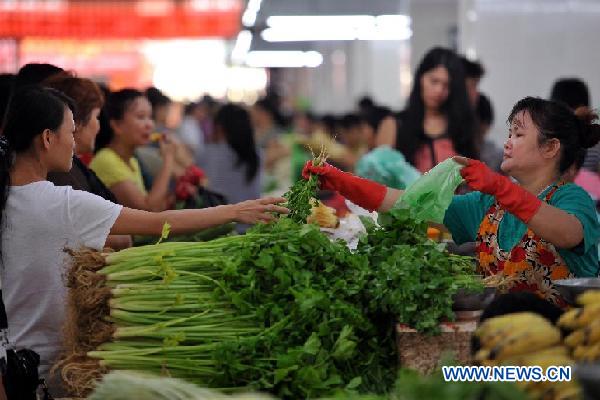China's inflation eases to 29-month low

China's Consumer Price Index (CPI), a main gauge of inflation, has eased to a 29-month low driven by falling food prices, leaving the government ample room to introduce more pro-growth measures to boost the slowing economy.
The CPI grew 2.2 percent year on year in June, the slowest pace since January 2010, the National Bureau of Statistics (NBS) announced on Monday.
It eased from May's 3 percent and April's 3.4 percent.
Compared with the previous month, it edged down 0.6 percent, according to the NBS.
In the first six months of 2012, the CPI climbed 3.3 percent compared with the same period of last year year.
Food prices, which account for nearly one-third of the weighting in the calculation of China's CPI, increased 3.8 percent last month from one year earlier, down from 6.4 percent in May.
According to the NBS, pork prices fell 12.2 percent year on year in June, eggs declined 3.6 percent, while vegetable prices increased 12.1 percent due to ongoing rain across the country.
In addition to food prices, easing wholesale prices at the factory gate due to over-capacity in a few industries and waning imported inflation also explained the slowing CPI, said Yao Jingyuan, a researcher from the Councilor's Office of the State Council, or China's cabinet.
The Producer Price Index (PPI), a main gauge of inflation at the wholesale level, fell 2.1 percent in June from a year earlier. It was the lowest reading since December 2009.
Commodity prices like crude oil and iron ore moved mildly this year, as the prolonged debt crisis in the Eurozone and the sluggish world economy sapped demand for goods.
Yao predicted such trends will continue in the second half of this year, keeping China's CPI away from effects of the imported inflation.
With a bumper grain harvest and steady supply of vegetables and eggs, bringing the yearly inflation within China's 4-percent target is out of question, he added.
While the slowing CPI bodes well for consumers, it ignited fears of deflation, as many believe macro-economic data for June that is due for release on Friday will point to a further slow-down of the world's second-largest economy.
Over the weekend, Premier Wen Jiabao said during an inspection tour of east China's Jiangsu province that China's economy is running at a generally stable pace, but there is still huge downward pressure. He called for more aggressive efforts to preset and fine-tune economic policies.
Li Changan, a professor with the University of International Business and Economics, presented a more optimistic view, however, arguing that it is too early to say the economy has fallen into deflation, considering the CPI still remained at a positive level.
But with a faster-than-expected slowdown of the economy, policy fine-tuning is badly needed, the professor warned.
In anticipation of June's weak data, China's central bank announced surprise cuts in the lending and deposit rates on July 5, the second such move in less than two months to spur growth.